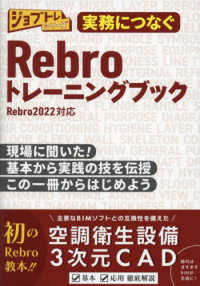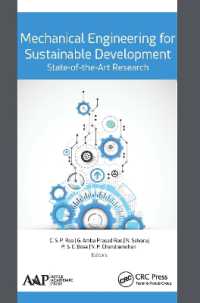- ホーム
- > 洋書
- > 英文書
- > Cinema / Film
Full Description
South Korean cinema is a striking example of non-Western contemporary cinematic success. Thanks to the increasing numbers of moviegoers and domestic films produced, South Korea has become one of the world's major film markets. In 2001, the South Korean film industry became the first in recent history to reclaim its domestic market from Hollywood and continues to maintain around a 50 percent market share today. High-quality South Korean films are increasingly entering global film markets and connecting with international audiences in commercial cinemas and art theatres, and at major international film festivals. Despite this growing recognition of the films themselves, Korean cinema's rich heritage has not heretofore received significant scholarly attention in English-language publications.
This groundbreaking collection of thirty-five essays by a wide range of academic specialists situates current scholarship on Korean cinema within the ongoing theoretical debates in contemporary global film studies. Chapters explore key films of Korean cinema, from Sweet Dream, Madame Freedom, The Housemaid, and The March of Fools to Oldboy, The Host, and Train to Busan, as well as major directors such as Shin Sang-ok, Kim Ki-young, Im Kwon-taek, Bong Joon-ho, Hong Sang-soo, Park Chan-wook, and Lee Chang-dong. While the chapters provide in-depth analyses of particular films, together they cohere into a detailed and multidimensional presentation of Korean cinema's cumulative history and broader significance.
With its historical and critical scope, abundance of new research, and detailed discussion of important individual films, Rediscovering Korean Cinema is at once an accessible classroom text and a deeply informative compendium for scholars of Korean and East Asian studies, cinema and media studies, and communications. It will also be an essential resource for film industry professionals and anyone interested in international cinema.








